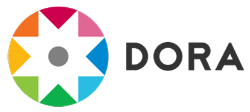The San Francisco Declaration on Research Assessment (DORA)
The San Francisco Declaration on Research Assessment (DORA) recognizes the need to improve the ways in which research is evaluated, beyond widely used journal-based metrics (e.g., Journal Impact Factor). The declaration is comprised of a set of recommendations developed by a group of journal editors and publishers at the Annual Meeting of the American Society for Cell Biology in San Francisco in 2012.
More than 22,300 individuals and organizations in 159 countries have signed DORA to date. This includes research funders, research institutions, publishers, metrics providers, and researchers themselves. From the Government of Canada, five major research funding agencies have signed DORA:
- Canadian Institutes of Health Research (CIHR)
- Canada Foundation for Innovation (CFI)
- Genome Canada
- Natural Sciences and Engineering Research Council (NSERC)
- Social Sciences and Humanities Research Council (SSHRC).
As a signatory to DORA, CIHR is committed to excellence in research funding and to ensuring that a wide range of research results are valued as part of the review process. Considering other ways to meaningfully assess research quality, including assessing different types of research outputs, allows researchers' work to be better assessed on its own merits.
DORA at CIHR
As a signatory to DORA, CIHR is committed to ensuring a wide range of research results and outcomes are valued as part of the peer review process.
In signing DORA, CIHR reaffirmed its commitment to excellence in research funding and responsible research assessment practices.
A number of tri-agency initiatives already align with the recommendations in DORA, such as policies that facilitate excellence in research data management practices, open access publishing, the ethical conduct of research; and the commitment to re-examine research excellence through the Tri-Agency Equity, Diversity, and Inclusion (EDI) Action Plan.
DORA's approach to responsible research assessment is reflected in CIHR's programs and strategies, for example:
- In CIHR's Project Grant Competition, applicants can highlight a broad range of outputs in the Most Significant Contributions section of the application.
- The Project Grant: Peer Review Manual directs reviewers to assess productivity broadly (i.e., not just based on publications) and consider the applicant's context (e.g., career stage, leave history).
- CIHR's Bias in Peer Review learning module includes a section on DORA in recognition that journal-based metrics can introduce bias in the peer review process. This module is mandatory learning for all CIHR reviewers.
- CIHR's commitment to adopting DORA's recommendations was highlighted within the CIHR Strategic Plan 2021-31, under the priority to advance research excellence in all its diversity.
Aligning CIHR's policies and practices with DORA's recommendations is one of the ways that CIHR is advancing a more inclusive concept of research excellence. CIHR will continue work to ensure strategies, policies, and guidance align with DORA and support responsible research assessment.
Resources
DORA
For applicants
For peer reviewers
- Peer Reviewer Resource: Broadening your assessment of research contributions and impacts
- Peer Reviewer Resource: Alignment of reviews with DORA
- Balanced, broad, responsible: A practical guide for research evaluators
- Bias in Peer Review (30 minute module)
- Natural Sciences and Engineering Research Council's Guidelines on the assessment of contributions to research, training and mentoring
- Examples of contributions and impacts by research pillar
Contact Information
For information about the San Francisco Declaration on Research Assessment (DORA) at CIHR, please contact:
- Date modified:
